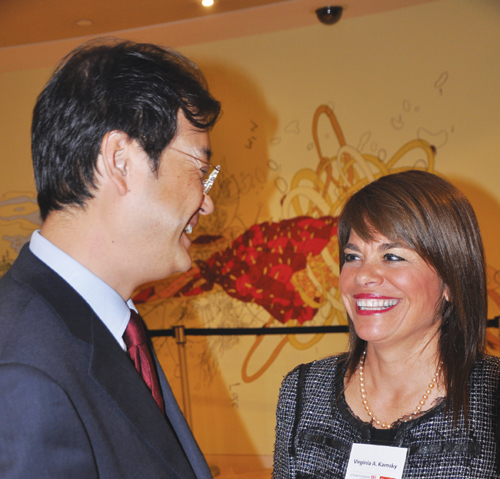Latest News
Birthday party brought forward to aid Sino-US ties
By Ariel Tung (China Daily)
Updated: 2010-10-29 11:06
 |
Large Medium Small |
|
 Virginia Kamsky (right), China Institute chairman, speaking to Li Zhou, assistant dean at Cheung Kong Graduate School of Business at the opening dinner of the China Institute Executive Summit on Thursday. [Photo/China Daily] |
NEW YORK - Helping Americans understand China is so important to Virginia Kamsky that she even rescheduled her father's 92nd birthday party just so she could attend the China Institute Executive Summit's opening dinner on Thursday.
This year, the seventh summit's dinner clashed with her father's birthday on Oct 28, so Kamsky and her family decided to hold the celebration a day earlier.
It was a tough decision, but her mother was supportive, just as she was supportive of the young Kamsky learning the Chinese language.
"My mom said that this opening dinner is very important," Kamsky said.
"It would create important dialogue for both countries to understand each other. She told me I should go to the summit, just like she told me I have to learn Chinese."
Kamsky started learning Chinese when she was 10, and it was her mother's foresight that she would be thankful for later in life. She was the first American child to learn Chinese at the China Institute in New York City in the 1960s, and is now its chairman. The institute is the oldest not-for-profit US organization focused on US-China relationship.
In 1980, she established Kamsky Associates, one of the earliest American investment organizations to be set up in China. She was selected by Crain's New York Business in 1990 as one of their "Forty under Forty to Succeed" and by Newsweek as one of "America's 25 Top Asia Hands".
When Kamsky became chairman of the board of trustees of China Institute in 2003, she saw the need for an annual business dialogue focused on understanding the economic relationship between the two countries.
She wanted to "broaden the scope of cultural understanding to include economic dialogue". Thus, the first China Institute Executive Summit was held in New York City in 2004.
She accredited this to the management and directors of China Institute, as well as people and corporations that have been supportive. But it was her mother who has been the most influential toward her cause.
"My mom said that if the US and China can't communicate, there will be seriously implications for world peace," Kamsky said.
"She said a dialogue is important for the two countries to understand each other and that world peace is most important."
The summit's opening dinner this year, held at Four Times Square, featured a discussion between Chen Zhiwei, professor of finance at Yale University School of Management, and Stephen S. Roach, non-executive chairman at Morgan Stanley Asia and senior fellow at Yale University.
On Friday, there are three panel discussions at the Princeton Club of New York on currency, trade and capital markets.
Corporate leaders, government officials and economists will share views on subjects relevant to US-China business activities and on the global influence of China.
Kamsky said she is looking forward to hearing what some of the best economic minds have to say about the US and China, especially during such "uncertain financial environment".
"In the past, the US would be a teacher to China. The situation is now quite dramatically changed," she said.
"I actually saw the change before the financial crisis. It's interesting China has about $3 trillion in foreign exchange reserves. This is a very dramatic change from what many economists ever imagined."
Kamky's interest in economics has been fueled by her father, Leonard Kamsky, an accomplished economist.
A highlight of the summit is that Beijing's Cheung Kong Graduate School of Business, in collaboration with China Institute, will bring senior executives from some Chinese small- and medium-sized corporations. In the past, this has posed a challenge for China Institute. Kamsky said she wants to set up more Chinese-language classes for children and business executives.
Kamsky, who raised her 12-year-old son to speak Chinese, said: "It starts from the language. If you don't understand the language, you won't understand the culture.
"Part of the problem between the US and China is the language barrier. If our children learn to speak Chinese, it will help avoid problems in future.
"American children need to be bilingual. They need to have Chinese friends. Chinese children need to be friends with American children.
"I think that will be the greatest way to solve conflicts in future between the US and China."
Although the summit's main aim is for experts of both countries to exchange ideas and information, Kamsky said "nothing will be more important to come of this summit than individual friendships".
"We want to do all that we can to solve conflicts between the two countries," she said.